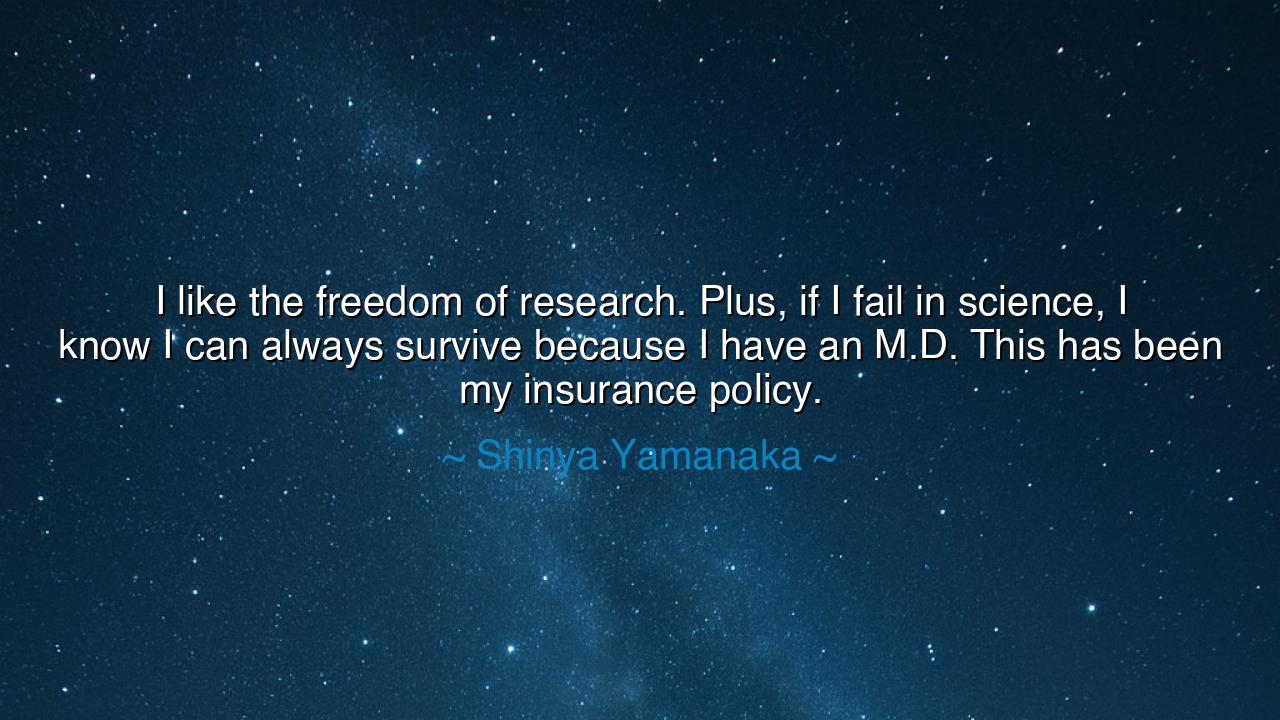
I like the freedom of research. Plus, if I fail in science, I
I like the freedom of research. Plus, if I fail in science, I know I can always survive because I have an M.D. This has been my insurance policy.






Hear, O children of wisdom, the words of Shinya Yamanaka, a man whose journey reflects the eternal dance between risk and security, between the pursuit of knowledge and the need for safety. "I like the freedom of research. Plus, if I fail in science, I know I can always survive because I have an M.D. This has been my insurance policy." In these words, Yamanaka speaks to us of the freedom inherent in the pursuit of science, and the safety that comes from having a backup, a guarantee, a reliable foundation in the form of an M.D.. For him, the M.D. is not just a credential, but a shield, a reminder that even in the face of failure, he can continue to survive, to learn, and to grow. But within this insurance policy, there is a deeper truth—one that reflects the ancient struggle between courage and security, the tension between pursuing dreams and ensuring safety.
In the ancient world, O children, there were those who sought wisdom through philosophy and reason, and there were those who sought to understand the world through the study of medicine and the healing arts. The Greek physician Hippocrates believed that knowledge of the body was the key to understanding the human soul, and he emphasized that a physician should possess not only medical skill but integrity and wisdom. However, there were also those who, like the great philosophers of the time, ventured into the unknown, seeking to unlock the secrets of the universe itself. These early seekers of knowledge, though they might not have had the scientific tools we possess today, embodied the spirit of risk-taking and inquiry, knowing that with every discovery came the possibility of failure, but also the hope of greater understanding.
Consider, O children, the story of Galileo Galilei, whose work challenged the very structure of the universe and led to a new understanding of the cosmos. Galileo did not have the insurance that Yamanaka speaks of. He risked his reputation, his career, and his very life to pursue the truth of the heliocentric model. His discoveries were so radical that they challenged the very beliefs that had guided humanity for centuries. Yet, like Yamanaka, Galileo found that freedom in research was worth the risk. Even when his work was met with opposition and censure, he pressed on, knowing that the pursuit of truth was worth more than any comfort or security. Galileo’s life reminds us that true discovery often requires stepping into the unknown without the safety net of certainty, just as Yamanaka does in his own research.
For Shinya Yamanaka, however, the M.D. represents more than just a credential—it is a safety net, a reminder that even in the failure of scientific endeavors, he has a path forward. This combination of freedom and security is an important lesson for all who seek knowledge. In the ancient world, there were adventurers like Alexander the Great, whose ambition knew no bounds, but also philosophers like Socrates, who found security in his principles and his pursuit of wisdom. The ancient world, too, understood the value of both. The pursuit of knowledge and exploration requires courage, but it also requires a foundation, a place of security, upon which to stand when the winds of uncertainty blow.
In the modern era, Yamanaka’s words remind us that science is not a path of certainty. The unknowns in his field, particularly in stem cell research, are vast and fraught with challenges. But Yamanaka also understands that the freedom to pursue bold ideas is worth the risk. Science, much like the arts, requires a willingness to step into the unknown, to fail, to rise again, and to learn from the mistakes made along the way. But it is also about having the courage to push forward when the path ahead is unclear, knowing that even if the journey fails, there is always the safety of knowledge and experience to fall back upon.
Thus, O children, the lesson is clear: knowledge and security are not mutually exclusive. Yamanaka teaches us that we must have the courage to venture into the unknown, to take risks, and to seek new frontiers of understanding. But we must also have the wisdom to ensure that, should we fall, we have a foundation to fall back on. Science, like all great pursuits, is a balance between adventure and safety, between dreams and practicality. And it is in this balance that true innovation and progress are made.
So, O children, let this wisdom guide you as you step into the world. Pursue your dreams with boldness and freedom, but never forget the importance of a foundation—whether it be in knowledge, character, or support. The pursuit of truth is a journey that requires both courage and foresight. Embrace the freedom to explore, but always remember that the wisdom to fall back on will guide you through the storms. Like Yamanaka, you must be willing to risk it all for the pursuit of knowledge, knowing that even in failure, there is always the possibility of rebirth and growth.






AAdministratorAdministrator
Welcome, honored guests. Please leave a comment, we will respond soon